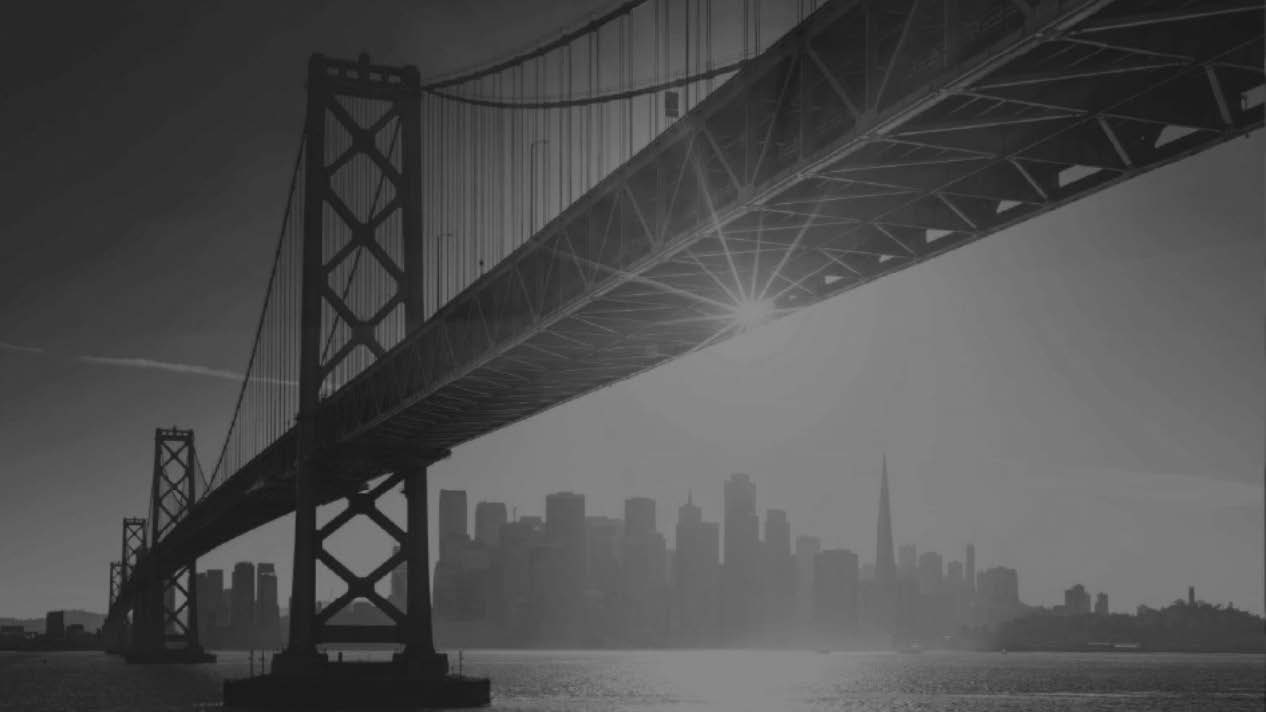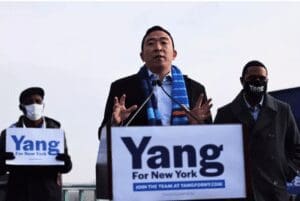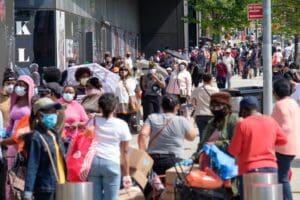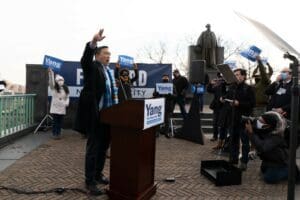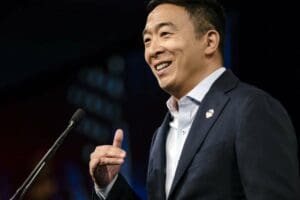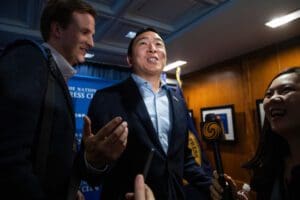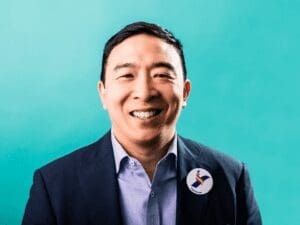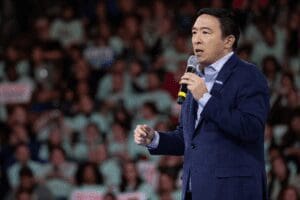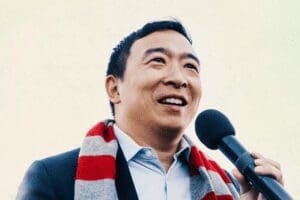We have more than enough work to go around for the next generation if we address one of our nation’s biggest problems: infrastructure.
By: Andrew Yang
I was born to Taiwanese American immigrants in upstate New York in the 1970s. My father worked at General Electric, my mother at BlueCross BlueShield. Like many others, the America I thought I inherited from them was one of opportunity. Work hard at a job or school, get into a trade or college, and start a family in a home you could afford. Work for a few decades, then retire.
The boomers have lived in a world largely like that: 90 percent of them ended up better off than their parents, and they assumed their children would do the same. The suburbs would continue to thrive, the number of cars per household would go up, and more frequent and exotic vacations for their children would be just oneof the payoffs for that lifetime of hard work to provide their children with opportunity.
In reality, that was never in the cards for many Americans. But now it’s barely in the cards for any.
The path to a decent life is more and more out of reach.
We’ve been brainwashed into thinking that the market determines everything — including human value — and that’s infected everything, from our public policy to our culture. It’s easy to get student loans, because the market says college must be valuable since it’s expensive.
But it’s impossible to discharge these loans, because bankruptcy is bad and defaulting on loans is irresponsible. We’ve driven metrics such as GDP and the stock market to the edge of a cliff, and then handed our children the wheel.
Students and graduates have amassed more than $1.6 trillion in student loan debt that many will never be able to pay off, while others will delay buying a home, getting married, and having kids because of this millstone around their necks. Owning a home is unrealistic in many cities for almost anyone starting out. Each successive generation has less in retirement savings, which, for millions, will make stepping back from employment in older age less and less feasible. Our infrastructure is crumbling beneath our feet. And climate change yet looms over this generation and every generation to come.
For many young people, building savings or a career is next to impossible when we’ve had two “once in a century” recessions in the past 15 years, just as millions are trying to establish a financial foothold. Economic inequality keeps climbing while the ability to save and get ahead keeps shrinking. Many recent graduates are told by family members and boomer editorialists to simply lower their sights and expectations and accept underemployment. And when millennials display any dissatisfaction with their grim inheritance, they are labeled entitled brats who spend all their money on avocado toast instead of saving for a home (never mind that it would take 22 years of skipping it to put down a down payment).
Each of these problems is big, and we need to start setting the next generations up for success while cleaning up our messes. But we can tackle them all with the same solution — rebuilding our economy and country with a massive and ongoing public works program.
To do it, we must build a human-centered economy, making sure it works for our children by ensuring that it stops working exclusively for those at the top.
Our winner-take-all economy has resulted in a country where, according to a 2017 CareerBuilder/Harris Poll survey of nearly 3,500 workers, 40 percent of people report usually living paycheck to paycheck. Forty percent of Americans also say they would have difficulty affording an unexpected $400 bill — and that was before the pandemic.
The economic deck is stacked even more significantly against millennials and young people. Because of that unprecedented student loan debt and the recessions they have suffered during their early careers, the homeownership rate for millennials is nearly 8 percentage points lower than that of previous generations. This has driven more than 20 percent to move back in with their parents — a situation that isn’t ideal for anyone involved. More than half have less than $5,000 in their savings account. It’s no wonder that the generation had only a 50-50 shot of doing better than their parents, pre-pandemic.
Our economy has failed an entire generation, and as the current pandemic puts us on the precipice of the greatest downturn since the Great Depression, the future looks dark for many.
It’s no wonder that nearly half of those who came of age after the financial crisis don’t have a positive opinion of capitalism — they have experienced its failures directly and personally. Capitalism has led to some of the greatest advances of modernity, including the technology we use every day. But it is not designed to maximize our well-being; it is designed to maximize investor returns and capital efficiency.
It is crystal clear now that what is good for capital is no longer good for many Americans. A perfect example: Amazon is setting record highs in stock market valuation while millions await economic relief from Congress.
A more human-centered economy wields the positives of capitalism to maximize human well-being and flourishing, instead of solely investment returns. I like to say human-centered capitalism has three basic principles: Humans are more important than money; markets exist to serve our common goals and values; we should be using human-based metrics to determine success, not money-based ones.
It sounds silly to need to say these things, and yet here we are, in 2020, still chasing stock market returns and gross domestic product growth as our mental health and opportunities evaporate. The nation adopted GDP more than 75 years ago, and even then, its creator, Simon Kuznets, said it was a terrible measurement of national well-being. A century later, it is even more true.
If we were looking at the right measurements, we would see life expectancy that has stagnated or decreased over the past several years; “deaths of despair” — suicides, as well as drug- and alcohol-related deaths, particularly among less educated white Americans — that have skyrocketed this century; and anxiety and depression at record levels. Labor force participation, a measure of how many working-age people are actually working or seeking work, is also unacceptably low — less than 64 percent before the current crisis.
At the same time, our infrastructure requires a $4.6 trillion investment to reach modern standards. With an investment in the next generations through a massive, ongoing public works program that addresses those infrastructure failings, we can help our children build a future they want for themselves and their country.
So where do we start? With those very same millennials whose economic future is in peril. About 40 percent of recent college grads are working a job that doesn’t require a college degree. Those with high school degrees today are worse off, as they experience more stagnant wages and a higher underemployment rate than the same cohort from 2000. With more than 70 million millennials and nearly the same number born to Generation Z, we have a vast number of young people who are looking for work and ways to make a difference. Let’s help them do that.
Imagine that you’re a recent high school or college grad, and you’re unsure what to do next. You have a variety of interests, but you don’t know how to turn that into a career. Family members are telling you to find just any job that pays the bills, but you’re more interested in finding meaningful work than a job that pays more.
What if we as a nation instead showed these job-seekers the list of human-centered stats that we’re looking to fix and asked them, “What problem do you want to solve?” The federal government can collect and collate this data, and then it can provide work for anyone who has a plan to address it. Whether that’s through the direct creation of federal jobs, grants to the states for projects they administer, or through public-private partnerships, the nation needs to address these problems.
If someone is worried about the state of our environment, let’s put them to work on sustainable infrastructure projects. Our grid can be modernized. Solar panels can be manufactured and installed. Turbines can be built, and urban planning can be used to minimize the carbon footprint of our biggest cities. The amount of work that can be done here to improve our way of life and the planet is staggering, and the various areas and levels of work that need to be done means an appropriate and exciting job can be found for tens of millions of people.
Do they find it disheartening that 21 million Americans don’t have access to reliable broadband? They can be a part of the solution, working on projects that expand access to rural areas and increase affordability in urban ones.
Our water system is aging, poisoning our kids to the tune of hundreds of billions of dollars in economic costs, on top of the human costs. I’m certain we’d see tens of thousands sign up to help address that.
There’s no shortage of work to be done that will provide the next generations with the meaningful jobs they desire. While infrastructure is one of the most obvious areas, there are so many more problem areas in this country that the passion and innovation of the next generation can solve.
There are 7.8 million job openings for in-home health aides, a number that will only increase as time goes on. The private sector values this work at $10 an hour, which is far too low for a physically and emotionally taxing job. The federal government can subsidize some and hire others to do this work, covering any gap left by the market.
More than 20 percent of newspapers in the US have closed, resulting in more and more people living in local news deserts. Imagine a world where recent graduates can fill that gap. Journalism majors could cut their teeth covering local politics, while business majors could explore new sources of income.
Is it unacceptable to them that more than 37,000 veterans are homeless and that millions lack affordable housing? We can use that passion to start a vastly scaled-up Veterans Community Project, building houses for those who need them.
The environment isn’t just about building for sustainability — there’s a lot of existing damage that we have to address. Let’s get young people working to build floodgates and move communities that are soon going to be (or already are) underwater. Wildfires in the US are costing us billions of dollars each year; surely, a large number of individuals would be willing to work clearing forests to lower that risk if given the opportunity and funding to do so.
There are tens of millions of jobs out there that would allow for meaningful contributions to this country. We can provide work to help get these underemployed generations back on track and ensure that future generations don’t get similarly left behind, all while engaging in one of the largest public works and modernization projects in history.
And what could their country do for them? As we make the right investments to shift our economy to be more human-focused, we can also help our children dig out of the mess that we left for them, and set them up for success. While they’re rebuilding the country, let’s help them build their future. First, each and every one of the jobs can start someone on a career path right, with training and mentorship, and let them build up experience they can use throughout their lives. This is an area that I feel especially passionate about.
My nonprofit group, Venture for America, is known for trying to rebuild local economies through entrepreneurship. What was just as important for me was mentoring the young individuals who came through the organization, many of whom I’m still in touch with to this day. These young people — all people — don’t just want jobs. They want pathways to develop and grow.
Day care workers can train to become early childhood educators or childhood psychologists. Home health care workers might transition to social work or health care. Our future architects and civil engineers could start by building homes for the indigent, and our next generation of Pulitzer Prize winners can start by covering local board meetings. After spending a year preventing wildfires in California, we might end up with an entire generation of park rangers and firefighters who fell in love with the job in this program. We could even create positions for people who have worked in these jobs for some time to mentor the next cohort.
Additionally, these jobs could be offered to people at various points in their lives, helping to guide their education and plans for the future. Maybe a recent high school grad who didn’t think college was for her will find a passion for engineering as she works on rebuilding a bridge. Or someone who works on an HVAC renovation to make a building more environmentally friendly might decide to pursue a trade program that lets them build that into a career. Someone who just graduated from community college with the intent to continue to a four-year college can join a project to see if the major they’re considering is an area they’d like to work in. And we could actually value their time — unlike the market, which all too frequently places the value of the work of interns at $0.
Giving people experience before they invest money in education will let them make smarter decisions, especially considering the massive cost of college. Which is another problem we can address. Much as the GI Bill provides funding for education for those who serve our country, we can also provide grants, scholarships, and loan forgiveness for individuals who work in any of these public works jobs.
We can ensure that everyone has proper health insurance, and pay everyone a living wage. And as this will be the first significant job that many, if not most, of these individuals have, we can ensure that they receive financial counseling at a time when they’re most in need of it, along with getting them set up with retirement accounts and a plan on how to save for their golden years. We have more than enough work to go around if we decide to invest in solving some of our biggest problems.
It seems like each major crisis or piece of legislation ends up bailing out people who were already doing well. We spent trillions of dollars to bail out banks in 2008.
For nearly four decades, we’ve been hearing about the trickle-down economy, which promised that returning our tax money to the investors and job creators would trickle down to the rest of us. And that’s how it was sold to us, as if getting a trickle of the success of this country is something to celebrate. We need to end it and build a trickle-up economy, benefiting our people, families, and communities, on up.
The recent pandemic led to the CARES Act, which finally started to put money in the hands of individuals to allow them to make it through the crisis. But helping people just make it through life shouldn’t be the goal of our government, and these constant shocks and failure to plan for increasingly common “once in a generation” market failures are a feature of our current, shareholder-driven, extreme economy.
We need to start measuring the right things in order to make sure our economy is geared toward maximizing our health and well-being. Instead of stock market prices, we should be maximizing our quality of life, health, mental health, childhood success rates, and environmental sustainability.
It starts with universal basic income. By returning money straight into the hands of our people, we can both retain jobs in small businesses around the country and give millions a path forward.
This will drive up demand both nationally and locally. It would improve our health and well-being and stress levels. The money would go straight to groceries, car repairs, child care, and local nonprofits — something we’ve now witnessed in the stimulus checks of the CARES Act and in recent UBI trials. It would give local small businesses a chance to survive.
We don’t exist to serve the economy. It’s the other way around. It’s time to rebuild our country and stop failing both ourselves and the next generation. We must put ourselves to work, improving our way of life and investing in our people on a historic scale — only if we do can we begin to right the imbalances we built for decades.
______________________________________________
Andrew Yang is an entrepreneur and former Democratic presidential candidate. He is also the founder of the nonprofit Humanity Forward.
______________________________________________
This story is part of The Great Rebuild, a project made possible thanks to support from Omidyar Network, a social impact venture that works to reimagine critical systems and the ideas that govern them, and to build more inclusive and equitable societies. All Great Rebuild coverage is editorially independent and produced by our journalists.










